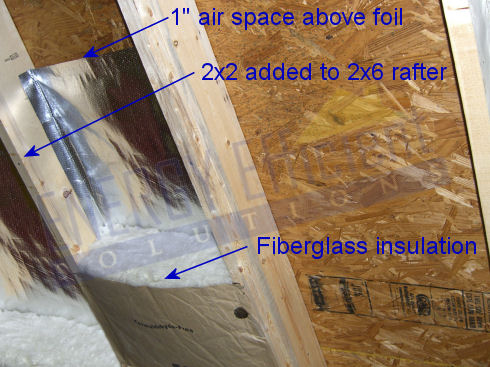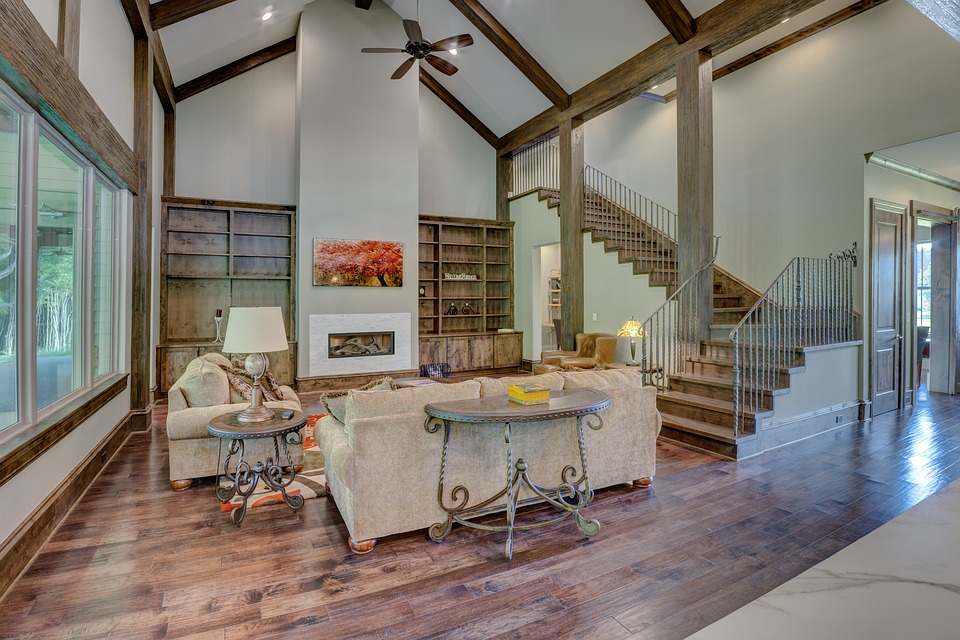The best way is from the roof. Closed cell foam insulation and new roofing is the way to go. For insulating You can use “insulation roof baffles” For ventilation Run soffit and pot vents …. Or Soffit and what I refer to as ½ ridge vent …. Anyway, if you do not already have ceiling fans installed in the vaulted ceiling rooms, you might want to consider this option.
A cathedral ceiling is a sloping and pointed ceiling which is usually high and open. Cathedral ceilings are a feature in many homes that add to value to the house because the high ceiling tends to make rooms look larger. Utilizing cellulose insulation , contractors blow the cathedral ceiling cavity completely full and do away with the need for outside ventilation. Although many view this as a new metho as stated previously, many contractors have been doing this for years. The Right Way To Insulate Attics and Cathedral Ceilings with Batts, using Certain Teed.
This type of roof assembly is designed so the air can flow up the soffit vent, through an insulation baffle, pass through the 1. Vaulted , or cathedral ceilings , pose special challenges to homeowners when it comes time to install insulation. A poorly insulated ceiling allows expensive heat to escape your home, resulting in. Cathedral ceilings were once popular due to their grandiose height and appearance, but these days many people avoid it because it is difficult to get proper cathedral ceiling insulation installed.
If you are looking for the best way to install your cathedral ceiling , then there are some mistakes you. Inexplicably, some well-built vaulted ceilings , complete with vents and fiberglass insulation , have moisture problems. The drywall becomes staine the insulation becomes damp and the roof wood can even begin to rot. Foam insulation is an excellent, although expensive solution. But it’s not a DIY project.
First, you need to prep the cathedral ceiling to be insulated. Grab a caulk gun, a ladder (or scaffolding if needed) and seal any areas where wiring or plumbing may be coming through the joists or wall plates. The cathedral ceiling in this older home is an important feature, but underperforming insulation made the room uncomfortable and expensive to heat and cool. The extremely cold weather that’s been buffeting most of the country has many homeowners thinking about insulation.
One of the questions contractors and renovators hear repeatedly is how to install vaulted ceiling insulation properly. Homes with cathedral ceilings pose a unique challenge when it comes to installing insulation. Kevin is working up the design for a new lakeside cabin in Tennessee, with plans currently calling for a scissor-truss roof and a vaulted ceiling over the kitchen and living area. He wants a trouble-free roof assembly, but local advice on insulation and air sealing has been hard to find.
How to insulate a vaulted ceiling is a bit dicier than adding insulation material to a flat one, as the narrower space between sloped roofs, and sloped ceilings cannot accommodate thicker batts in the way a conventional attic can. Bernice from Midlan Ontario wants to know how to get more insulation into her vaulted , or cathedral ceiling. The common problem with structures like this, that we call compact roofs, is that there is not usually enough space for a lot of insulation and a lot of ventilation. Treat your cathedral ceiling just like a wall, with a different angle.

Foam it Green spray foam bonds overhead. Check out the Overhead Project video to get some tips and techniques to make this project easier. New, conflicting advice on insulating vaulted ceiling Everything I've ever read over the years indicates that in between the insulation and the roof sheathing, I should leave an inch or so layer of space for air to convect from the soffit vents to the ridge ventilation, to prevent moisture buildup. Insulating a Cathedral Ceiling with Foam it Green.
Attic trusses typically have a sloping ceiling ( cathedral ) that poses a different insulating solution. As you can see in the photo above and the 3D model below the attic trusses create a section of sloped ceiling and flat ceiling much like you’d get in a house with a cathedral ceiling. High R , radiant and vapor barrier. The right way to insulate attics and cathedral ceilings with batts cathedral ceiling insulation are my rafters deep enough. Pics of : How To Insulate Cathedral Ceilings.
Are my rafters deep enough the right way to insulate attics and cathedral ceilings with batts as. Installing batt insulation onto a cathedral ceiling will prevent excessive heat loss through the ceiling of a typical wood frame house. Using the simple steps listed below as a guide, the average homeowner should be equal to the task. Insulate Vaulted Ceiling Thermapan SIPs are used in walls, roofs, floors and foundations in commercial and residential construction. We need advice on adding more insulation to the cathedral ceilings of our New Hampshire house (shown below).
The roof consists of 4xrafters spaced every inches and topped with pine boards that originally served as both sheathing and the finished ceiling. If you overfill, just use a serrated knife to shave back the spots so you can put up drywall. While rotting cathedral ceilings have primarily been a problem in cold climates, similar problems have also been reported in unvented cathedral ceilings in areas with warm, moist climates. While it is possible to use a permeable insulation – open-cell foam, fiberglass, or cellulose – in an unvented cathedral ceiling , it is risky.

Ensure insulation extends to the outside edge of the exterior top plates and to the peak of the cathedral ceiling. Ensure ends of insulation are butted together and flush to underside of framing. When using kraft-faced batts: Fasten kraft face tabs of insulation to the underside of framing members.
An easy step by step instructional video on how to properly insulate a ceiling brought to.
No comments:
Post a Comment
Note: Only a member of this blog may post a comment.